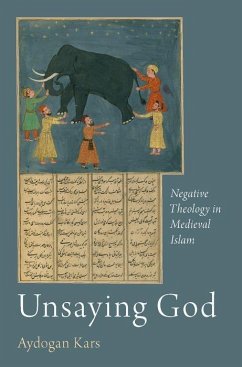Aydogan Kars
Unsaying God
Aydogan Kars
Unsaying God
- Gebundenes Buch
- Merkliste
- Auf die Merkliste
- Bewerten Bewerten
- Teilen
- Produkt teilen
- Produkterinnerung
- Produkterinnerung
Focusing on the first seven centuries of the Islamic intellectual history, Unsaying God examines the ways in which Muslim, and some Jewish, scholars negated what they said about God in order to indicate the limits of human thought on the absolute. Ardogan Kars argue that contemporary studies on apophasis and negative theology in Islam are strongly motivated by the challenges and demands of modernity, and tend to preserve European universalism in thelanguage of pluralism.
Andere Kunden interessierten sich auch für
![Islam in the School of Madina Islam in the School of Madina]() Ahmad Al-Qalawi Ash-ShinqitiIslam in the School of Madina73,99 €
Ahmad Al-Qalawi Ash-ShinqitiIslam in the School of Madina73,99 €![Islam in the School of Madina Islam in the School of Madina]() Ahmad Al-Qalawi Ash-ShinqitiIslam in the School of Madina60,99 €
Ahmad Al-Qalawi Ash-ShinqitiIslam in the School of Madina60,99 €![Ahmad Al-Ghazālī, Remembrance, and the Metaphysics of Love Ahmad Al-Ghazālī, Remembrance, and the Metaphysics of Love]() Joseph E B LumbardAhmad Al-Ghazālī, Remembrance, and the Metaphysics of Love103,99 €
Joseph E B LumbardAhmad Al-Ghazālī, Remembrance, and the Metaphysics of Love103,99 €![Modern Islamic Authority and Social Change, Volume 2 Modern Islamic Authority and Social Change, Volume 2]() Modern Islamic Authority and Social Change, Volume 2159,99 €
Modern Islamic Authority and Social Change, Volume 2159,99 €![Modern Islamic Authority and Social Change, Volume 1 Modern Islamic Authority and Social Change, Volume 1]() Modern Islamic Authority and Social Change, Volume 1159,99 €
Modern Islamic Authority and Social Change, Volume 1159,99 €![Keys to the Qur'an Keys to the Qur'an]() Shaykh Fadhlalla HaeriKeys to the Qur'an19,99 €
Shaykh Fadhlalla HaeriKeys to the Qur'an19,99 €![Keys to the Qur'an Keys to the Qur'an]() Shaykh Fadhlalla HaeriKeys to the Qur'an13,99 €
Shaykh Fadhlalla HaeriKeys to the Qur'an13,99 €-
-
-
Focusing on the first seven centuries of the Islamic intellectual history, Unsaying God examines the ways in which Muslim, and some Jewish, scholars negated what they said about God in order to indicate the limits of human thought on the absolute. Ardogan Kars argue that contemporary studies on apophasis and negative theology in Islam are strongly motivated by the challenges and demands of modernity, and tend to preserve European universalism in thelanguage of pluralism.
Hinweis: Dieser Artikel kann nur an eine deutsche Lieferadresse ausgeliefert werden.
Hinweis: Dieser Artikel kann nur an eine deutsche Lieferadresse ausgeliefert werden.
Produktdetails
- Produktdetails
- Verlag: Oxford University Press
- Seitenzahl: 360
- Erscheinungstermin: 24. Mai 2019
- Englisch
- Abmessung: 244mm x 161mm x 35mm
- Gewicht: 627g
- ISBN-13: 9780190942458
- ISBN-10: 0190942452
- Artikelnr.: 55392185
- Herstellerkennzeichnung
- Libri GmbH
- Europaallee 1
- 36244 Bad Hersfeld
- gpsr@libri.de
- Verlag: Oxford University Press
- Seitenzahl: 360
- Erscheinungstermin: 24. Mai 2019
- Englisch
- Abmessung: 244mm x 161mm x 35mm
- Gewicht: 627g
- ISBN-13: 9780190942458
- ISBN-10: 0190942452
- Artikelnr.: 55392185
- Herstellerkennzeichnung
- Libri GmbH
- Europaallee 1
- 36244 Bad Hersfeld
- gpsr@libri.de
Aydogan Kars earned his Ph.D. in Religion at Vanderbilt University. His primary research field is medieval intellectual history with a focus on Sufism and theology. He has been serving as a Lecturer in the Centre for Religious Studies and the Coordinator of the Islamic Studies Program at Monash University.
* INTRODUCTION
* Why Sufism, and Why the Thirteenth Century?
* A Guide to Negative Theology: Are the Mu'tazilites Negative
Theologians?
* Can We Still Speak of Negative Theology Tout Court?
* Moving Forward
* Coming to Terms: "Apophasis", "Performance", and God's Gender
* Compass
* PATH ONE. DOUBLE NEGATION: ISMAILI APOPHATICISM
* The Background: "Radicals of All Radicals"
* Thingness of God?
* Double Negation: the Repetitive Form
* Permutations and Performances
* Disseminations: Ismaili Apophaticism beyond Ismailis
* Later Developments
* Tusi: Sufi Paths of Ismaili Apophaticism
* Dimension of Apophatic Theology in Later Sufi and Ismailli
Connections
* Summary
* PATH TWO. NECESSARILY DISSIMILAR: PHILOSOPHICAL APOPHATICISM
* Beginnings: the End-less
* The Kindian Dilemma in the Tenth Century
* Discursive Thought and Non-Discursive Intellection
* Protectors of the Divine Oneness: al-Tawhidi's Circle in Baghdad
* Philosophical Apophaticism in Andalusia: Ibn Masarra
* Twelfth-Century Andalusia: From Philosophy to Sufism
* Aristotle in Andalusia: al-Batalyawsi, Maimonides, and Ibn Sab'in
* Jewish Mysticism and Arabic Philosophical Apophaticism: Eyn Sof and
Lam Yazal
* Sufis and Genies: Philosophical Apophaticism within Sufi Epistemology
* Summary
* PATH THREE. "YES AND NO": PARADOXICAL APOPHATICISM AND DIALECTICAL
LOGIC
* Paradox in Literature and Sufism: an Overview
* Paradox of Human Apotheosis: from Sufism to Philosophy?
* Paradoxes of Late Antiquity in Philosophy
* Paradox in Theological Questions
* The Divine Paradox: When Incomparability and Immanence are Balanced
* Symmetrical Approach to Language, and Dialectical Logic
* Logic and Nomenclature in Paradoxical Apophaticism
* Healing with Opposites: Performativity in Paradoxical Apophaticism
* Summary
* PATH FOUR. AGAINST DISCOURSE: AMODAL APOPHATICISM
* The Background: "Bila Kayfa" as a Theological Concept
* Divine Nature Uninterpreted: Between Anthropomorphism and
Apophaticism
* Bila Kayfa Apophaticism and Early Hanafism
* Early Ash'arism: From Anti-Interpretivism to Anti-Anthropomorphism
* Anti-Interpretivism among Early Sufis?
* Anti-Interpretivism during the Formalization of Sufism
* Interpretivism in Persian Sufism
* Hanbali Sufism and the Qadiriyya
* The Emergence of the Rifa'iyya
* Suhrawardiyya and the State-Sponsored "Sunni Bila Kayfa" Project
* Kubrawi Interpretivism
* Bila Kayfa Mysticism in Andalusia: the Background
* Sufism and Bila Kayfa in the Thirteenth-Century Muslim West
* Summary
* CONCLUSION
* BIBLIOGRAPHY
* Why Sufism, and Why the Thirteenth Century?
* A Guide to Negative Theology: Are the Mu'tazilites Negative
Theologians?
* Can We Still Speak of Negative Theology Tout Court?
* Moving Forward
* Coming to Terms: "Apophasis", "Performance", and God's Gender
* Compass
* PATH ONE. DOUBLE NEGATION: ISMAILI APOPHATICISM
* The Background: "Radicals of All Radicals"
* Thingness of God?
* Double Negation: the Repetitive Form
* Permutations and Performances
* Disseminations: Ismaili Apophaticism beyond Ismailis
* Later Developments
* Tusi: Sufi Paths of Ismaili Apophaticism
* Dimension of Apophatic Theology in Later Sufi and Ismailli
Connections
* Summary
* PATH TWO. NECESSARILY DISSIMILAR: PHILOSOPHICAL APOPHATICISM
* Beginnings: the End-less
* The Kindian Dilemma in the Tenth Century
* Discursive Thought and Non-Discursive Intellection
* Protectors of the Divine Oneness: al-Tawhidi's Circle in Baghdad
* Philosophical Apophaticism in Andalusia: Ibn Masarra
* Twelfth-Century Andalusia: From Philosophy to Sufism
* Aristotle in Andalusia: al-Batalyawsi, Maimonides, and Ibn Sab'in
* Jewish Mysticism and Arabic Philosophical Apophaticism: Eyn Sof and
Lam Yazal
* Sufis and Genies: Philosophical Apophaticism within Sufi Epistemology
* Summary
* PATH THREE. "YES AND NO": PARADOXICAL APOPHATICISM AND DIALECTICAL
LOGIC
* Paradox in Literature and Sufism: an Overview
* Paradox of Human Apotheosis: from Sufism to Philosophy?
* Paradoxes of Late Antiquity in Philosophy
* Paradox in Theological Questions
* The Divine Paradox: When Incomparability and Immanence are Balanced
* Symmetrical Approach to Language, and Dialectical Logic
* Logic and Nomenclature in Paradoxical Apophaticism
* Healing with Opposites: Performativity in Paradoxical Apophaticism
* Summary
* PATH FOUR. AGAINST DISCOURSE: AMODAL APOPHATICISM
* The Background: "Bila Kayfa" as a Theological Concept
* Divine Nature Uninterpreted: Between Anthropomorphism and
Apophaticism
* Bila Kayfa Apophaticism and Early Hanafism
* Early Ash'arism: From Anti-Interpretivism to Anti-Anthropomorphism
* Anti-Interpretivism among Early Sufis?
* Anti-Interpretivism during the Formalization of Sufism
* Interpretivism in Persian Sufism
* Hanbali Sufism and the Qadiriyya
* The Emergence of the Rifa'iyya
* Suhrawardiyya and the State-Sponsored "Sunni Bila Kayfa" Project
* Kubrawi Interpretivism
* Bila Kayfa Mysticism in Andalusia: the Background
* Sufism and Bila Kayfa in the Thirteenth-Century Muslim West
* Summary
* CONCLUSION
* BIBLIOGRAPHY
* INTRODUCTION
* Why Sufism, and Why the Thirteenth Century?
* A Guide to Negative Theology: Are the Mu'tazilites Negative
Theologians?
* Can We Still Speak of Negative Theology Tout Court?
* Moving Forward
* Coming to Terms: "Apophasis", "Performance", and God's Gender
* Compass
* PATH ONE. DOUBLE NEGATION: ISMAILI APOPHATICISM
* The Background: "Radicals of All Radicals"
* Thingness of God?
* Double Negation: the Repetitive Form
* Permutations and Performances
* Disseminations: Ismaili Apophaticism beyond Ismailis
* Later Developments
* Tusi: Sufi Paths of Ismaili Apophaticism
* Dimension of Apophatic Theology in Later Sufi and Ismailli
Connections
* Summary
* PATH TWO. NECESSARILY DISSIMILAR: PHILOSOPHICAL APOPHATICISM
* Beginnings: the End-less
* The Kindian Dilemma in the Tenth Century
* Discursive Thought and Non-Discursive Intellection
* Protectors of the Divine Oneness: al-Tawhidi's Circle in Baghdad
* Philosophical Apophaticism in Andalusia: Ibn Masarra
* Twelfth-Century Andalusia: From Philosophy to Sufism
* Aristotle in Andalusia: al-Batalyawsi, Maimonides, and Ibn Sab'in
* Jewish Mysticism and Arabic Philosophical Apophaticism: Eyn Sof and
Lam Yazal
* Sufis and Genies: Philosophical Apophaticism within Sufi Epistemology
* Summary
* PATH THREE. "YES AND NO": PARADOXICAL APOPHATICISM AND DIALECTICAL
LOGIC
* Paradox in Literature and Sufism: an Overview
* Paradox of Human Apotheosis: from Sufism to Philosophy?
* Paradoxes of Late Antiquity in Philosophy
* Paradox in Theological Questions
* The Divine Paradox: When Incomparability and Immanence are Balanced
* Symmetrical Approach to Language, and Dialectical Logic
* Logic and Nomenclature in Paradoxical Apophaticism
* Healing with Opposites: Performativity in Paradoxical Apophaticism
* Summary
* PATH FOUR. AGAINST DISCOURSE: AMODAL APOPHATICISM
* The Background: "Bila Kayfa" as a Theological Concept
* Divine Nature Uninterpreted: Between Anthropomorphism and
Apophaticism
* Bila Kayfa Apophaticism and Early Hanafism
* Early Ash'arism: From Anti-Interpretivism to Anti-Anthropomorphism
* Anti-Interpretivism among Early Sufis?
* Anti-Interpretivism during the Formalization of Sufism
* Interpretivism in Persian Sufism
* Hanbali Sufism and the Qadiriyya
* The Emergence of the Rifa'iyya
* Suhrawardiyya and the State-Sponsored "Sunni Bila Kayfa" Project
* Kubrawi Interpretivism
* Bila Kayfa Mysticism in Andalusia: the Background
* Sufism and Bila Kayfa in the Thirteenth-Century Muslim West
* Summary
* CONCLUSION
* BIBLIOGRAPHY
* Why Sufism, and Why the Thirteenth Century?
* A Guide to Negative Theology: Are the Mu'tazilites Negative
Theologians?
* Can We Still Speak of Negative Theology Tout Court?
* Moving Forward
* Coming to Terms: "Apophasis", "Performance", and God's Gender
* Compass
* PATH ONE. DOUBLE NEGATION: ISMAILI APOPHATICISM
* The Background: "Radicals of All Radicals"
* Thingness of God?
* Double Negation: the Repetitive Form
* Permutations and Performances
* Disseminations: Ismaili Apophaticism beyond Ismailis
* Later Developments
* Tusi: Sufi Paths of Ismaili Apophaticism
* Dimension of Apophatic Theology in Later Sufi and Ismailli
Connections
* Summary
* PATH TWO. NECESSARILY DISSIMILAR: PHILOSOPHICAL APOPHATICISM
* Beginnings: the End-less
* The Kindian Dilemma in the Tenth Century
* Discursive Thought and Non-Discursive Intellection
* Protectors of the Divine Oneness: al-Tawhidi's Circle in Baghdad
* Philosophical Apophaticism in Andalusia: Ibn Masarra
* Twelfth-Century Andalusia: From Philosophy to Sufism
* Aristotle in Andalusia: al-Batalyawsi, Maimonides, and Ibn Sab'in
* Jewish Mysticism and Arabic Philosophical Apophaticism: Eyn Sof and
Lam Yazal
* Sufis and Genies: Philosophical Apophaticism within Sufi Epistemology
* Summary
* PATH THREE. "YES AND NO": PARADOXICAL APOPHATICISM AND DIALECTICAL
LOGIC
* Paradox in Literature and Sufism: an Overview
* Paradox of Human Apotheosis: from Sufism to Philosophy?
* Paradoxes of Late Antiquity in Philosophy
* Paradox in Theological Questions
* The Divine Paradox: When Incomparability and Immanence are Balanced
* Symmetrical Approach to Language, and Dialectical Logic
* Logic and Nomenclature in Paradoxical Apophaticism
* Healing with Opposites: Performativity in Paradoxical Apophaticism
* Summary
* PATH FOUR. AGAINST DISCOURSE: AMODAL APOPHATICISM
* The Background: "Bila Kayfa" as a Theological Concept
* Divine Nature Uninterpreted: Between Anthropomorphism and
Apophaticism
* Bila Kayfa Apophaticism and Early Hanafism
* Early Ash'arism: From Anti-Interpretivism to Anti-Anthropomorphism
* Anti-Interpretivism among Early Sufis?
* Anti-Interpretivism during the Formalization of Sufism
* Interpretivism in Persian Sufism
* Hanbali Sufism and the Qadiriyya
* The Emergence of the Rifa'iyya
* Suhrawardiyya and the State-Sponsored "Sunni Bila Kayfa" Project
* Kubrawi Interpretivism
* Bila Kayfa Mysticism in Andalusia: the Background
* Sufism and Bila Kayfa in the Thirteenth-Century Muslim West
* Summary
* CONCLUSION
* BIBLIOGRAPHY








